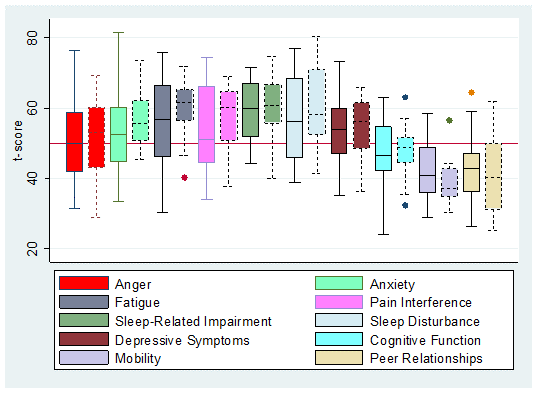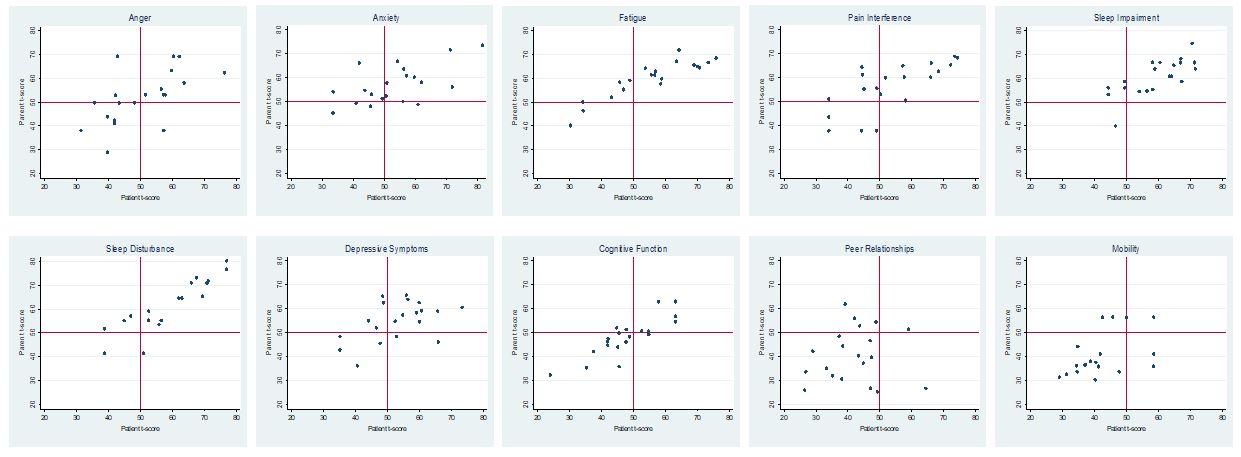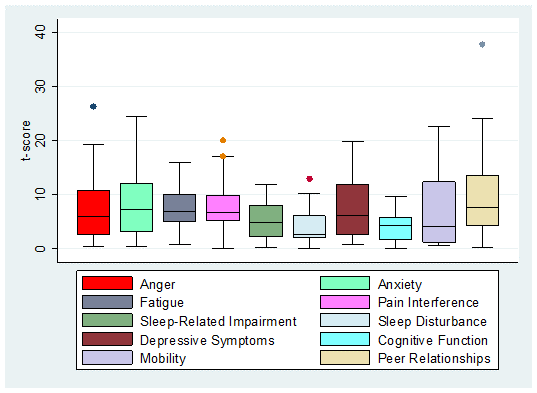Session Information
Session Type: Poster Session C
Session Time: 10:30AM-12:30PM
Background/Purpose: Vasculitis is a group of chronic, relapsing diseases that can lead to significant morbidity due to both disease and treatment, impacting patients’ health related quality of life (HRQoL). Little is known about how vasculitis affects children’s HRQoL. This study compared the perceptions of children with vasculitis to their parent’s perceptions of their child’s HRQoL.
Methods: A prospective, cross-sectional pilot study of patients with vasculitis seen in a pediatric rheumatology clinic at a tertiary care facility from 11/2021-2/2024. Patients were eligible if they had received a diagnosis of chronic vasculitis before their 18th birthday. Subjects and one of their parents completed Patient-Reported Outcomes Measurement Information System (PROMIS) patient and parent proxy short forms, respectively. PROMIS measures are reported as t-scores normalized to a U.S. population to a mean of 50 and a standard deviation of 10. Physicians scored disease activity and damage concurrently using the Pediatric Vasculitis Activity Score (PVAS) and the Pediatric Vasculitis Damage Index (PVDI).
Results: Twenty-four patients were enrolled with 20 having both patient and parent PROMIS short forms completed. Median age at enrollment was 14.5 (IQR 12,16) years with median age at diagnosis of 12.2 (IQR 10.3,15) years. Patients had ANCA-associated vasculitis (n=15), Behçet’s disease (2), polyarteritis nodosa (2), or IgA vasculitis (1). Subjects had a median PVAS score of 0 (IQR 0,3) with 7/20 with active disease defined by a PVAS of >0. 19/20 patients had at least one item of damage as scored on the PVDI, with a median score of 2.5 (IQR 1,5). PROMIS t-scores for patients and parents are shown in Figure 1. The median score for nearly all domains for both subject and parent responses was worse than the reference population, except for anger in the subject responses. While the overall distributions of responses between subject and parent widely overlapped, when looking at the difference in subject-parent dyads, considerable discordance was frequently seen, with no consistent trend of parents rating their child worse than the subjects themselves (Figure 2). Figure 3 shows the distribution of the absolute magnitude of the difference between subject-parent dyads. In the domains of anger, anxiety, fatigue, pain, depression, peer relationships, and mobility, the 75th percentile for the magnitude of the difference was 10 or higher, demonstrating significant discordance.
Conclusion: Both patients with pediatric-onset vasculitis and their parents report reduced patient HRQoL in several physical and psychosocial domains. However, patients and parents frequently have discordant scores relative to reference populations. These results demonstrate the importance of capturing both the patient and parent response to gain a more complete picture of how pediatric vasculitis impacts HRQoL. Further research could investigate the impact of age on this discordance and the variation of discordance across different vasculitides, all to help develop targeted approaches to support children with vasculitis.
To cite this abstract in AMA style:
Peckenpaugh C, Hersh A, Stern S, Treemarcki E, Merkel P, James K. Parent Verses Patient Perspectives of Health-Related Quality of Life Among Children with Vasculitis [abstract]. Arthritis Rheumatol. 2024; 76 (suppl 9). https://acrabstracts.org/abstract/parent-verses-patient-perspectives-of-health-related-quality-of-life-among-children-with-vasculitis/. Accessed .« Back to ACR Convergence 2024
ACR Meeting Abstracts - https://acrabstracts.org/abstract/parent-verses-patient-perspectives-of-health-related-quality-of-life-among-children-with-vasculitis/



